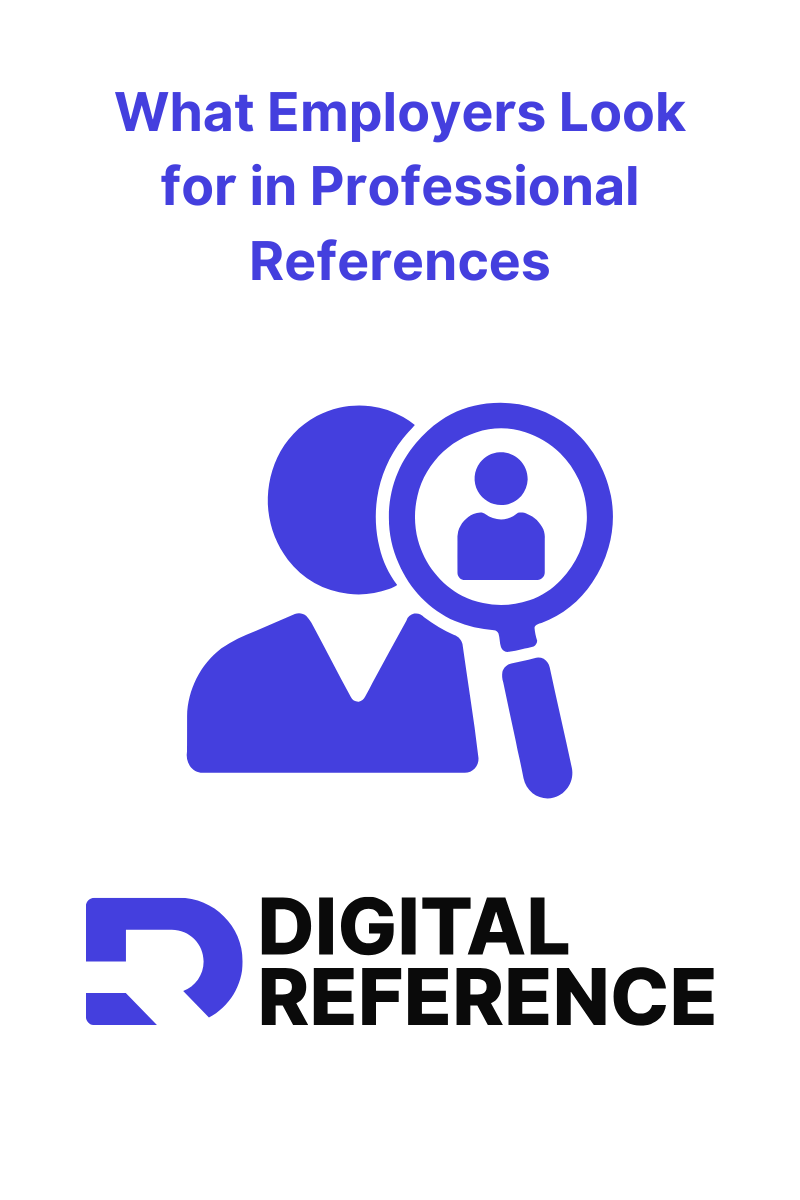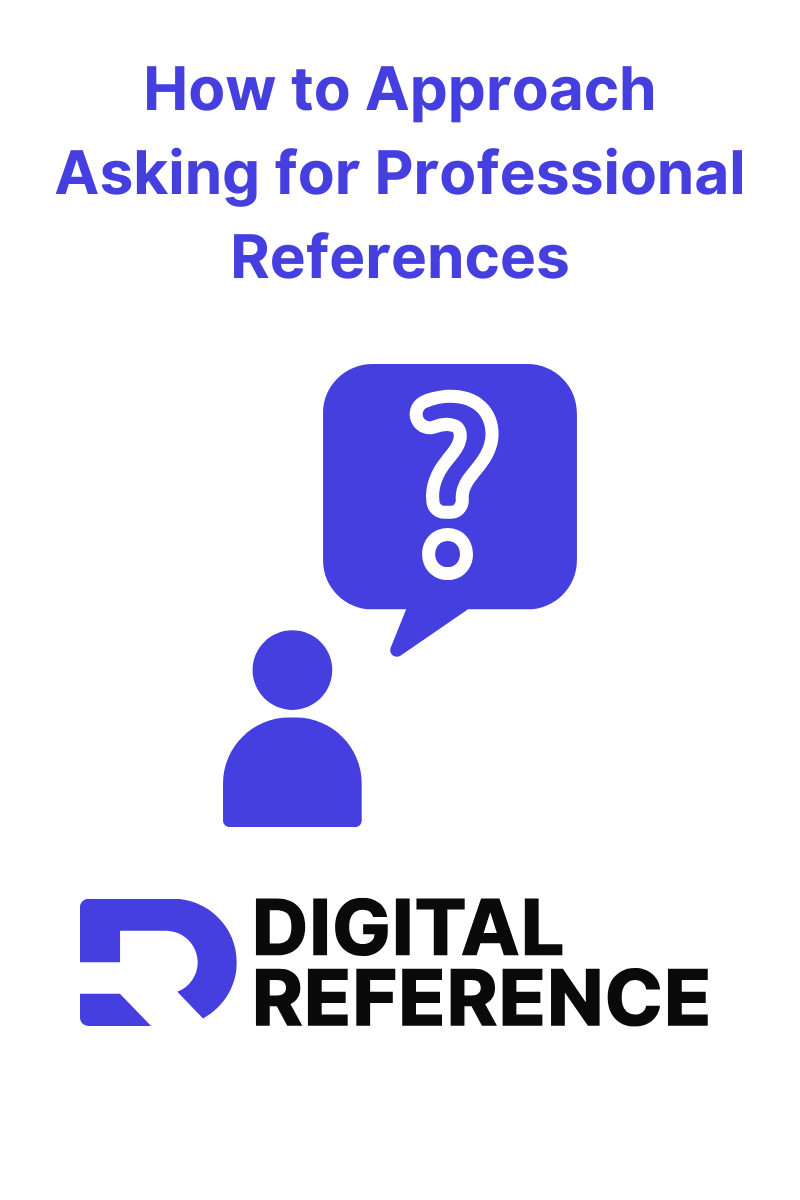Professional References for Freelancers and Independent Consultants: How to Build Trust When You Work for Yourself

Professional References for Freelancers and Independent Consultants: How to Build Trust When You Work for Yourself

When you work for yourself, reputation is everything. Whether you’re a freelance designer, an independent HR consultant, or a fractional executive, your next project often depends on your last one. But how do you prove your value to someone who hasn’t worked with you yet?
That’s where professional references come in.
Even in the world of independent work, references remain one of the most trusted ways to validate your experience, build confidence with prospects, and differentiate yourself in a crowded market. And unlike traditional employment settings, freelancers and consultants have unique opportunities—and unique challenges—when it comes to collecting and using references effectively.
Need a refresher on the basics? Check out our Ultimate Guide to Professional References to learn what they are, why they matter, and how to start building your own reference network.
Why Freelancers and Consultants Still Need References
It’s easy to assume that a sharp portfolio or a few LinkedIn testimonials can speak for themselves. And while those tools are essential, they often aren’t enough—especially when you're pitching larger projects, selling retainer-based services, or entering a new client relationship where trust hasn’t yet been built.
Professional references still matter—sometimes more than ever. Here’s why they remain critical for freelancers and independent consultants:
- They provide powerful social proof.
No matter how polished your pitch is, prospective clients want to hear what others think about working with you. References offer insight into your professionalism, results, and communication—helping clients feel confident in their decision, especially for high-stakes or long-term work. - They close the trust gap.
Without a formal employer structure, clients may wonder about your reliability or accountability. References demonstrate that you’ve delivered successfully before—independently, collaboratively, and with consistent follow-through. - They give you a competitive edge.
When bidding on projects or submitting proposals, a strong reference—especially from a respected client—can be the factor that tips the scale in your favor. - They reinforce your personal brand.
As a consultant, you are the product. A well-chosen reference can speak directly to your niche, values, and impact—helping shape your long-term reputation. - They have long-term value.
With permission, you can repurpose references across proposals, your website, and even social media—making them one of the most durable assets in your business toolkit.
In short, professional references tell the story of your success from someone else’s point of view—which makes them more credible, more human, and often more persuasive than any pitch deck or case study.
Who Makes a Strong Reference When You’re Self-Employed
One of the advantages of working for yourself is having more freedom—not just in the work you do, but in how you build your reputation. When it comes to professional references, you’re not limited to a former boss or HR manager. In fact, your network may offer even stronger advocates who’ve seen your value firsthand.
Here are some of the best types of references for freelancers, consultants, and fractional leaders:
- Past Clients
These are often your most persuasive references. Clients who’ve hired you—especially for high-impact or repeat work—can speak directly to the results you delivered, how you collaborate, and what it’s like to work with you.
- Agency or Firm Collaborators
If you’ve worked on contract for an agency or within a consulting team, project leads or directors can speak to your reliability, adaptability, and ability to deliver within fast-moving, client-facing environments.
- Executive Stakeholders
For larger projects, internal leaders or sponsors—such as department heads or VPs—can validate your strategic thinking and ability to align with business goals.
- Former Employers
If you’re earlier in your independent career, don’t overlook references from past full-time roles. Former managers or colleagues who are familiar with your strengths can still speak credibly about your professionalism and capabilities.
- Subcontractors and Vendors
If you’ve led other specialists or worked in a team of independents, collaborators you’ve managed or partnered with can provide a peer perspective on your leadership and project coordination.
- Strategic Partners or Advisory Clients
Board members, ecosystem collaborators, or non-client stakeholders who’ve worked closely with you may offer strong endorsements, especially if your work involves thought leadership, cross-functional collaboration, or systems-level impact.
Pro tip: Make sure your references align with the kind of work you’re pursuing. A great reference doesn’t just say you did a good job—it confirms that you deliver the kind of results you want to be known for. Prioritize references that support your current positioning, whether that’s strategic consulting, facilitation, design, or executive leadership.
How to Ask for References (Without Making It Awkward)
The key to getting great references? Timing, clarity, and confidence. Here’s how to approach it.
When to Ask:
- After completing a successful project or hitting a major milestone
- When a client gives you positive feedback
- Just before you wrap up an engagement—when your impact is top of mind
How to Ask:
Send a concise, polite message. For example:
Hi [Name], I really enjoyed working together and appreciate your feedback on the project. I’m putting together a few references for future consulting opportunities and would love to include you. Would you feel comfortable serving as a reference or sharing a short testimonial about our work together?
If they agree:
- Ask if they’d prefer a phone call, written quote, or LinkedIn recommendation
- Offer to provide a summary or refresher on what you accomplished together
- Thank them and keep them in the loop on how their reference is being used
Where to Use Your References
As a freelancer or consultant, your references shouldn’t stay buried in a Word doc. Use them to support your personal brand across platforms:
- Portfolio sites — Add short quotes or endorsements near relevant case studies
- Proposals and pitch decks — Include a short section that features relevant references
- Freelance platforms — Some allow written references alongside ratings or reviews
- LinkedIn — Ask for public recommendations that mirror your client feedback
- Cold outreach — Reference your experience and offer contacts on request
This makes your references visible, credible, and easy to access for anyone considering hiring you.
What to Do If You Run Into Reference Challenges
Freelancers face unique hurdles when collecting and using references. Here’s how to navigate them:
The client is under an NDA:
Ask if they’re comfortable speaking about your work in general terms. If not, anonymize the reference—e.g., “Senior VP at a Fortune 500 company.”
They loved your work but haven’t responded:
Follow up once with a brief, friendly reminder. If they still don’t respond, move on and focus on more responsive relationships.
They’re not comfortable being contacted by phone:
Offer an alternative like a written quote, LinkedIn testimonial, or reference email.
You’re just getting started:
If you’re new to freelance or consulting, lean on professors, collaborators, or early clients from pilot projects. The goal is to build your foundation, one trusted relationship at a time.
How to Make Your References Work Harder
References don’t just validate your work—they can become a strategic asset. Here’s how to maximize their impact:
- Include metrics or outcomes when possible: “Increased team retention by 22%” is more persuasive than “great to work with.”
- Pair references with relevant case studies or service pages
- Repurpose them across your site, marketing materials, and proposals
- Keep them fresh—check in periodically and update with recent projects or roles
- Consider turning them into full testimonials (with permission)
Final Thoughts
Independent professionals may not have HR departments vouching for them—but they have something better: direct, measurable impact. That’s exactly what your references can showcase.
Whether you’re pitching a new client, applying for a fractional executive role, or joining a vendor network, strong references give your work a voice beyond your own. And in a world where trust leads to opportunity, that voice can be your biggest competitive edge.
Want more reference strategies? Explore our Ultimate Guide to Professional References, or check out these helpful reads:
Understanding the Power of Professional References
- Why Professional References Matter More Than Ever
- The Importance of Professional References
- Collecting Professional References: The Do's and Don'ts
- Best Tools for Collecting Professional References
- The Best Professional Reputation Management Tool
Elevate Your Personal Brand
- The Ultimate Guide to Video Resumes
- Radical Authenticity: Bridging Brené Brown's Insights with Digital Reference's Mission
Rethinking the Resume
For the Bold & Independent
Subscribe to our newsletter
We'd love to have you follow our journey, learn about to new features and functionality, and get access to talent ecosystem news.


.png)

